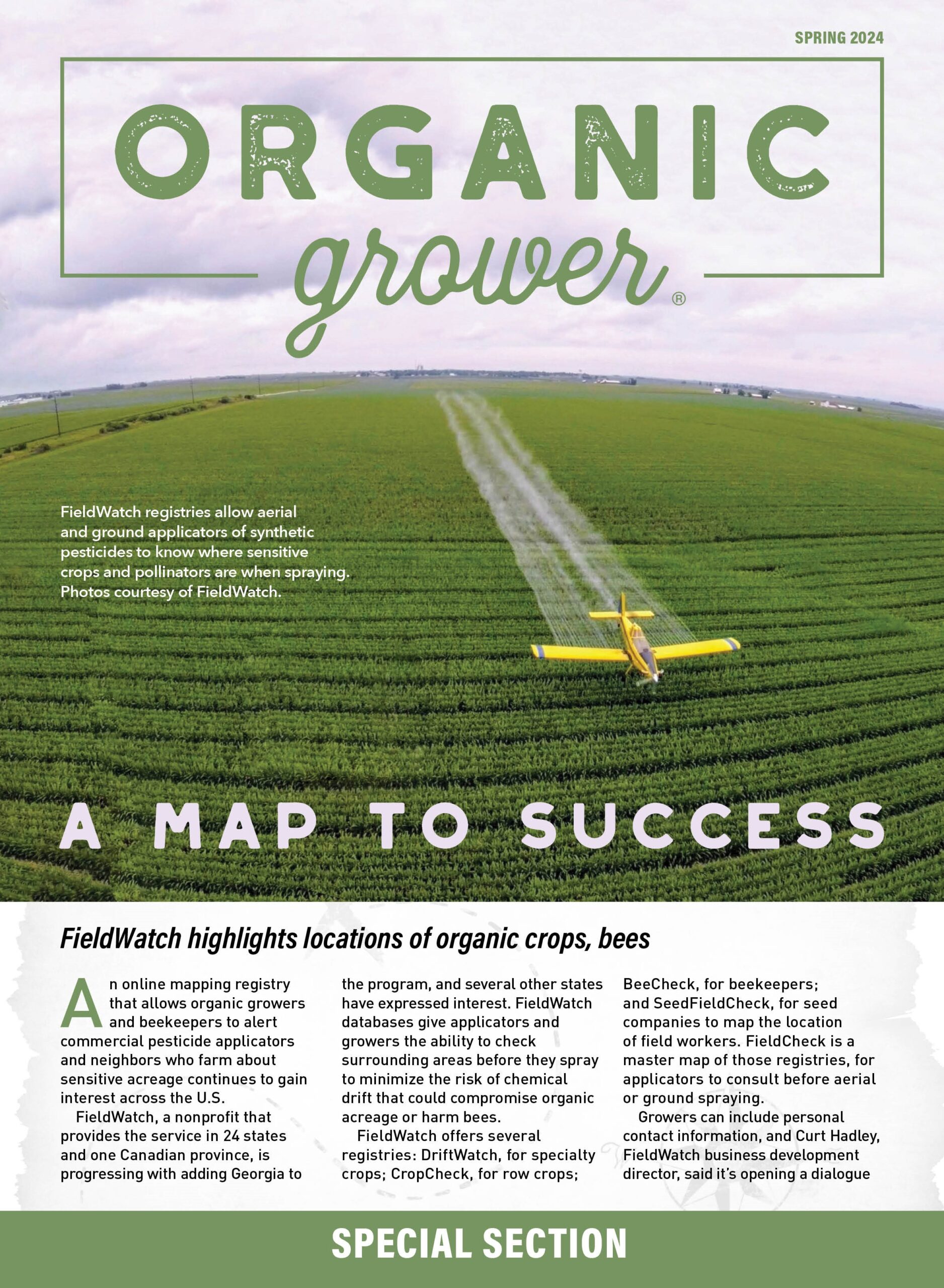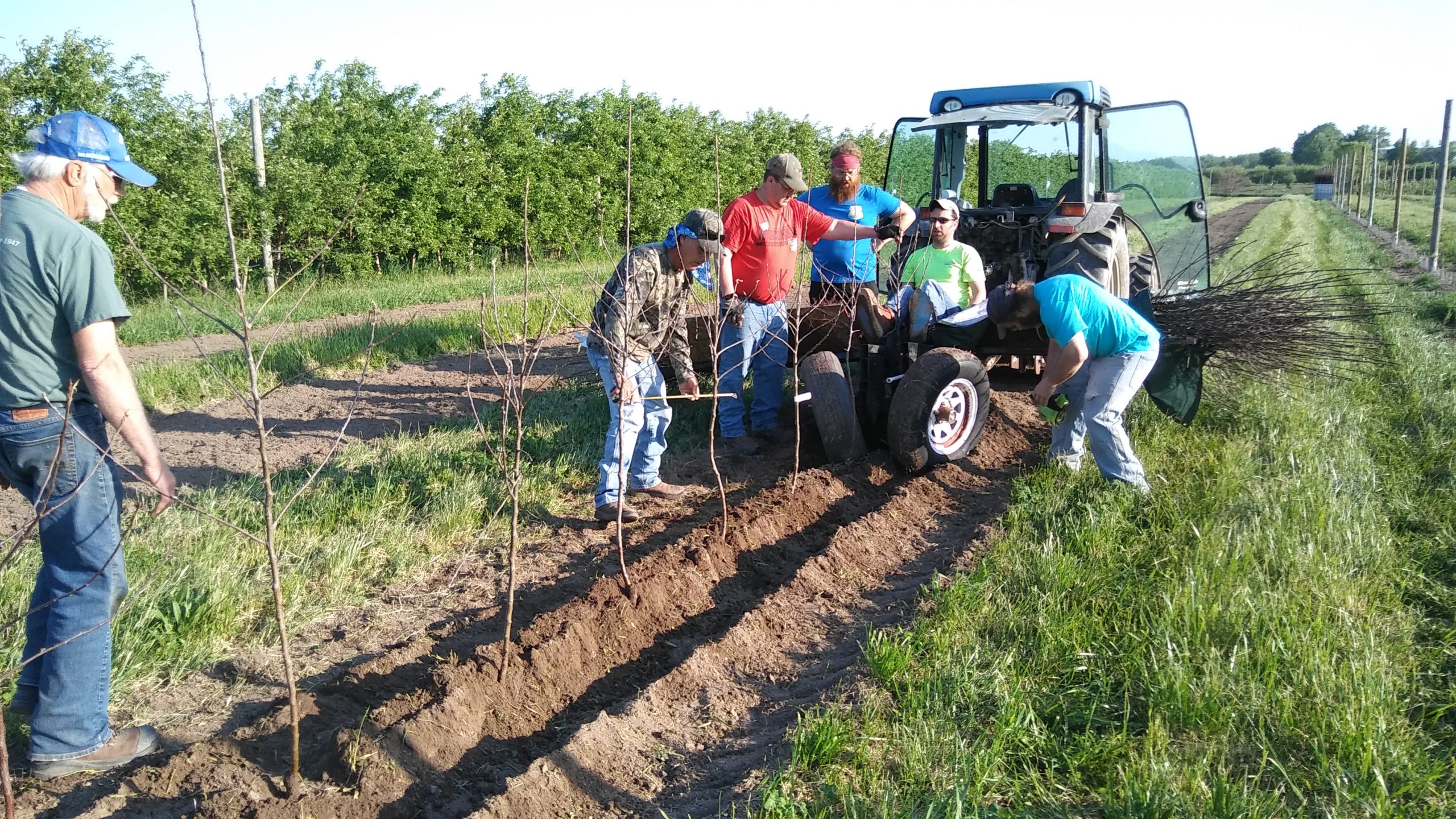
Feb 17, 2022
How an apple grower and Extension specialist joined to pioneer Midwestern IPM
In Flushing, Michigan, Jim Koan grew his parents’ orchard and a family of his own.
Concern for his own children’s best health, a desire to save money and a habit of risk-taking led him to take Almar Orchards organic in 1995, well before organic produce was as widely sought by consumers. An Extension specialist who relocated from the West often collaborated with him.
Koan spoke at the Great Lakes Fruit, Vegetable & Farm Market EXPO in December in Grand Rapids, Michigan, about his early efforts at growing organic pome fruit in a state whose apple growers haven’t widely adopted organic growing. In his presentation, Koan characterized himself, and many other growers, as a habitual risk-taker, who tried new things often.
“All of you out there are risk-takers because you’re all farmers, and you have a passion for what you’re doing, and you probably can’t imagine yourself doing something else,” Koan said. “But day-to-day activity is always taking risks that are going to affect your life. You don’t have tenure as an apple grower or a fruit grower or an organic farmer.”
Early days
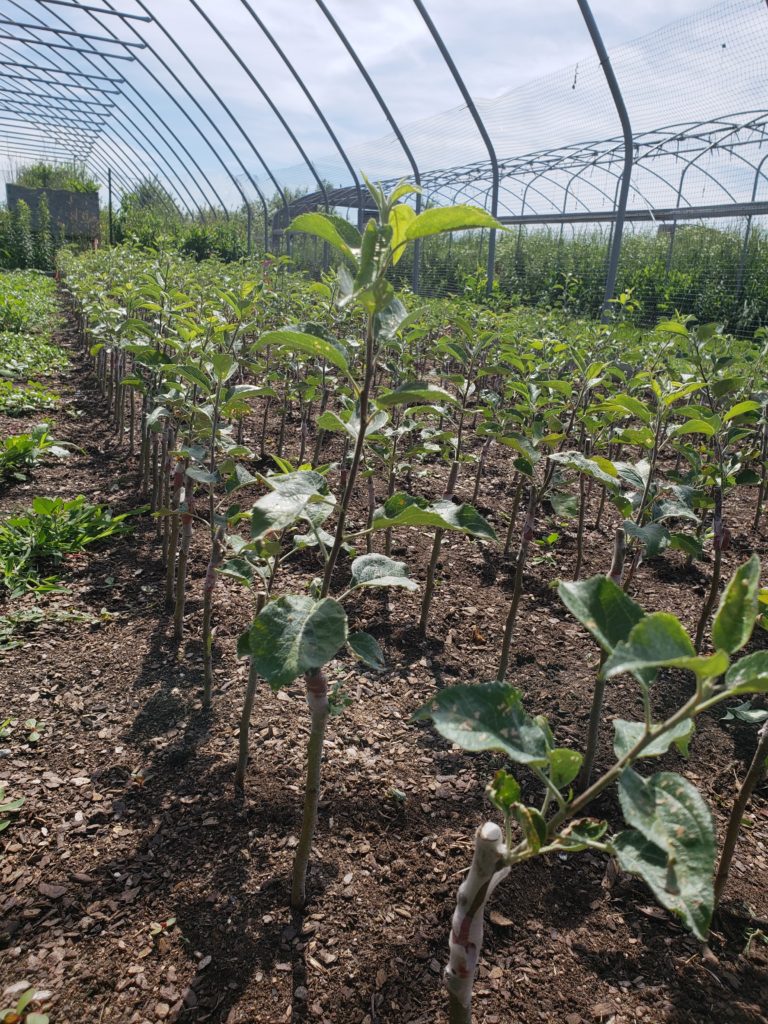
Many of his friends went to work in the factories of Flint, Michigan, but Koan earned a degree at the University of Michigan and spent six years teaching public school. He eventually earned a master’s degree and was accepted into graduate school at age 28 when his father offered him a partnership in the family orchard, which was 15 acres at that time.
“It took me a while to decide to do that, because he and I couldn’t get along,” Koan said. “I vowed that I was never going to argue with my dad. It was the hardest thing I ever did in my life. And I probably never would have been able to do that if it wasn’t for my wife (Karen). She spent hours talking to me at night, teaching me to keep my mouth shut.”
The farm at that time was on a calendar spray system for disease and pest control. Integrated pest management was a relatively new concept, but he jumped at the opportunity – he said the decision was mostly due to his nature as a risk-taker.
A decision point
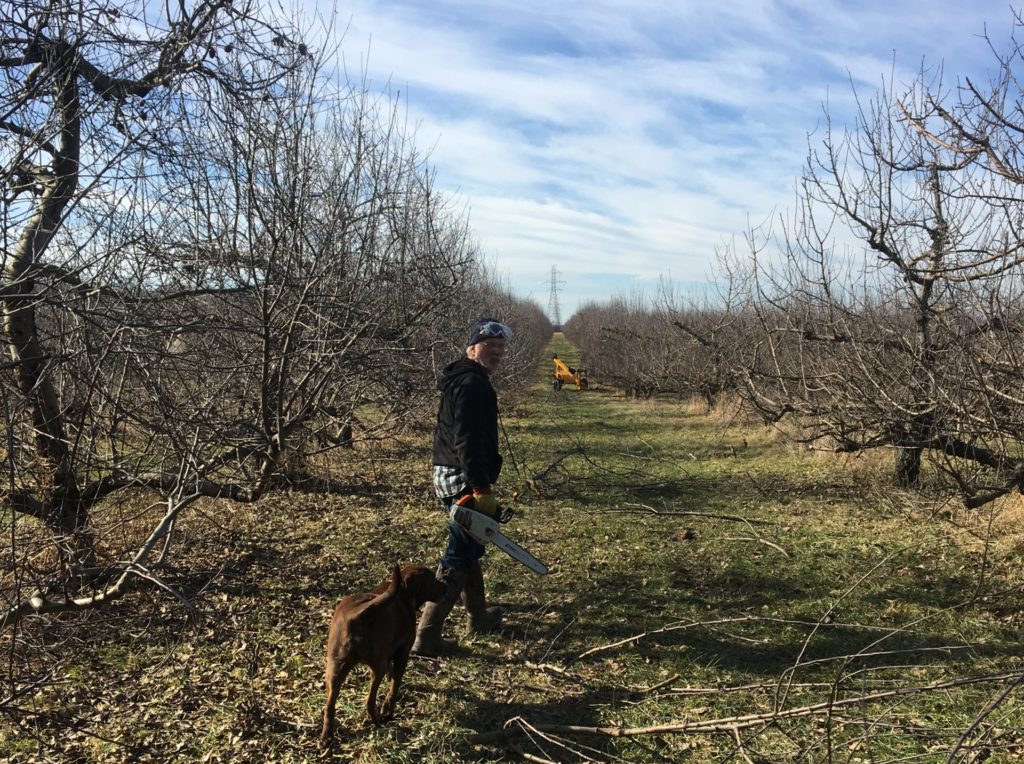
“I was able to treat everything that was going to happen, before it happened, and control that so that I didn’t have any economic damage,” Koan said. “I pushed that program and got to the point where it was almost organic – and it was cheaper,” Koan said. “I wasn’t going into organic because it was more sustainable in the sense that you could grow food that was nutritionally more dense or it had less residue on it. It was strictly from a business standpoint.”
At age 31, Jim Koan became a father for the first time.
“At that point in time, my attention shifted from growing apples to raising that child, and within the next eight years, we had four more. In 10 years, we had five children. We spent a lot of time with our children, and that was the most important part.”
Prioritizing his children, and the education they received, played into his decision to go organic.
“These children, they were growing up and spending their youth working on the farm – they all had jobs to do,” he said. “It really bothered me to expose them to all of the dangerous pesticides and herbicides. For the first time ever, I was not willing to take a risk with their lives. I’ll take a risk with my life, but not theirs. Maybe down the road, 15, 20, maybe 30 years, they were going to have health problems due to exposure to those pesticides. Because I was beginning to distrust what the government was telling me.”
In 1998, Koan received his first organic certificate for 20 acres of orchard. Today, about half of the farm’s 300 acres are dedicated to organic apples and pears.
Koan also realized there were plentiful natural pest predators within an unsprayed orchard, and spraying was like bombing a village populated by both enemies and friendlies. “Are you going to nuke your village?” he said. But as time went on without spraying, additional pests showed up – pests that he previously hadn’t had to deal with slowly built up populations and became an issue.
A fruitful collaboration
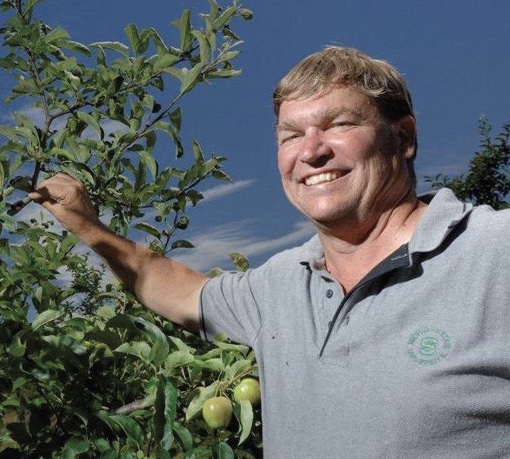
Enter entomologist Larry Gut, who came to Michigan State University in 1997, eventually hiring other staff to support him.
A native of Southern California, Gut earned a doctorate degree in entomology from Oregon State University (OSU) in 1985. He was mentored by OSU’s Peter Westigard, “who taught him that working closely with growers through on-farm research projects was the best way to inspire change,” according to a leaflet by the Michigan State Horticultural Society (MSHS).
Gut, who died in 2021, and who was honored posthumously by MSHS at a banquet at the Great Lakes EXPO, “wanted to move Michigan ahead, to more sustainable agriculture,” and he also brought along instrumental people to work with him in the lab and field research.
In a video recording played at the banquet, Gut said that Koen of Almar Orchards was one of his earliest collaborators.
“My main thrust of my research then, and passion, was mating disruption – using sex pheromones to manage insects – and this was the perfect place to do it,” he said.
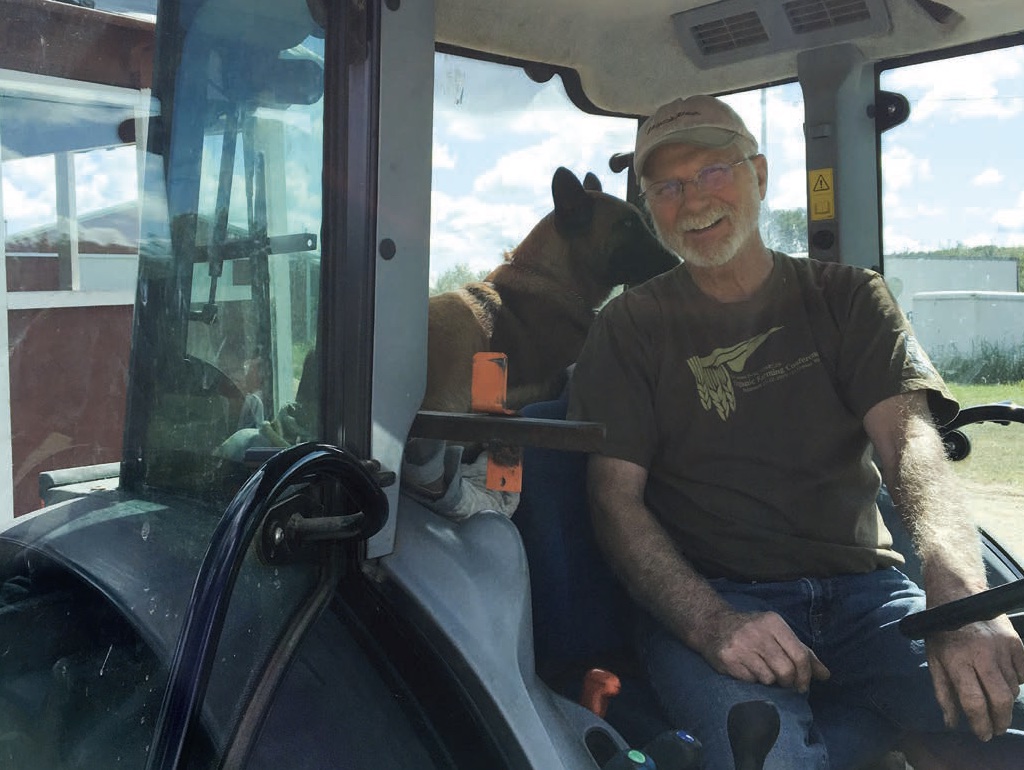
The collaboration of Koan and Gut’s group bore much fruit, MSHS said.
“His team of students and collaborators have developed novel insights into how moths communicate using sex pheromones, then used this knowledge to design more effective, economical and environmentally friendly strategies to protect Michigan’s tree fruit industries.” said Kathleen Gut, Larry’s wife, who accepted the award on his behalf at the EXPO banquet.
“Integrated pest management, when Larry started it, was something really kind of esoteric,” she said. “He loved growers and he loved doing on-farm research – he had that model for himself, the model of going to the growers and showing them that respect to work with them closely.”
As it happens
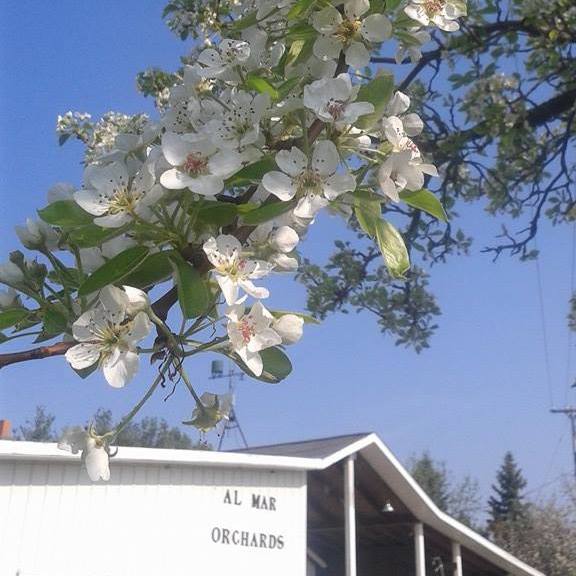
Today, the farm comprises two limited liability corporations: Almar Orchards and JK’s Scrumpy. Each year, Koan gifts two of his five children stock in the companies, and they are gradually assuming ownership of the family business in that way. Like their father, having earned degrees first, they migrated back to the farm and share the same passion for organic and sustainable growing for others to enjoy.
The farm market is open year-round and receives enough business to stay profitable during that time.
“Because we are organic, we are a place of destination,” Koan said. “We have people that make a trip of two, three hundred miles to make a trip to the farm, and they don’t buy a dozen donuts and a gallon of cider – they’ll drop four hundred, five hundred dollars. So it’s a few sales, but it’s big sales, because we are organic. (Customers) see big value in going to the farm.”
On the shelves of the farm market are apples, pears, fresh cider, hard cider and a variety of other value-added products like dried apple slices. About 80% of his apples are processed into applesauce, fresh cider or hard cider. Hard cider, he said, can be further processed into “witches’ vinegar,” and the farm sells four different vinegar drinks.
Products are packaged and shipped out to 25 states and internationally to Japan and South Korea, but “our biggest market is still our farm market,” he said. The bar has 24 taps – two taps for each of the 12 drinks offered – so that one person can taste the products while another is having “growler” containers filled.
Many of his apple varieties are grafted onto Budagovsky 9 (Bud 9) rootstock – which requires a trellis system, since it’s weaker than m.9 or g.42.
“Honeycrisp is actually one of the easier varieties to grow organically,” Koan said.
Koan said he sees organic apple growers at a sort of a crossroads. On the one hand, Gut and many others are gone from MSU – one of the last of Gut’s crew, Matthew Grieshop, in January started work in California as director of Cal Poly’s new Center for Organic Production and Research. And Koan said that many of the techniques and strategies he’s used in the past don’t seem to work as well. But demand for organic produce is higher than ever. And he does see a lot of new products being developed and research done.
“We need new tools, and the exciting thing is, there were very little tools we had in the organic grower’s toolbox,” Koan said. “Now, every pest control company with deep pockets is doing more research and coming up with more biopesticides and bio-fungicides.
“And even the small guys are doing this research. There is hope ahead. So it’s an optimistic picture I’m painting here.”

